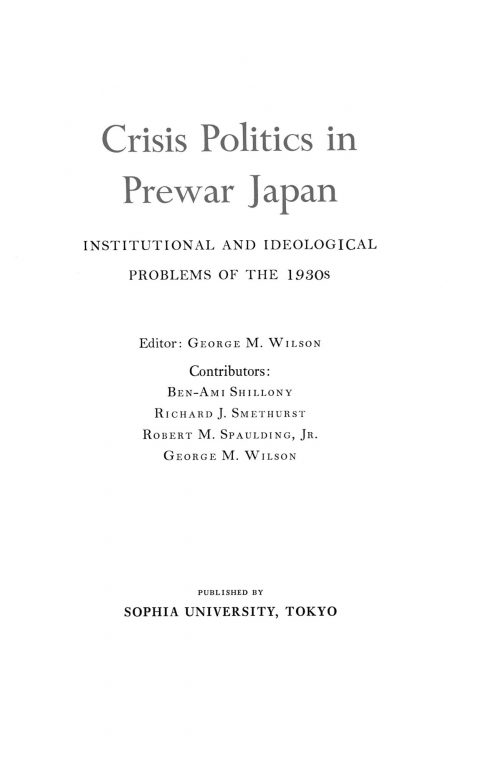Crisis Politics in Prewar Japan: Institutional and Ideological Problems of the 1930sEdited by George Macklin Wilson
Monographs (1970) pp. 1–87
Japan during the decade prior to World War II has been the subject of numerous works stressing the political chaos and disorder that so often marked the scene. In this book, the authors take a fresh look at the problem of political crisis in the 1930s. Their concern is to analyze various political forces that were active at the time: Mr. Smethurst writes about a huge pressure group, the Military Reserve Association, and its role in the Minobe constitutional crisis of 1935. Mr. Shillony examines the background and behavior of the army’s ‘young officers’ who attempted and nearly achieved a coup d’état in February 1936. And Mr. Spaulding surveys the record of one wing of the civil bureaucracy, the so-called ‘new bureaucrats’ who came on the scene in the 1930s. Mr. Wilson’s concluding essay highlights one important aspect of the ideological makeup of political actors in the 1930s–their preoccupation with the ‘lessons’ of the Meiji Restoration of 1868 and the presumed applicability of such lessons to the political struggles of their own time.
One conclusion, substantiated by all the authors, is that Japanese political life in the middle and late 1930s was far more complicated than simple explanations such as ‘the army’ versus ‘the bureaucracy’ would suggest. Disagreements between politically powerful elites like the army, the reservists, and the bureaucrats were often overshadowed by even sharper factional dissent at virtually all levels within these elites. Much of the complexity of Japanese politics in this period stemmed from the intense character of such intra-group conflicts and their lack of clear-cut ideological lines of demarcation.
In sum, this volume treats the crises in Japanese politics during the 1930s on their own terms, and not merely as way stations on the ‘road to war’. The articles in the book reflect new departures in research by specialists in modern Japanese history, although they should be of interest not only to those who work on Japan but also to general readers concerned with crisis politics in modernizing societies.
1970. xiii + 87 pages.
Hardback ¥1,000/$10.00/€10.00.
